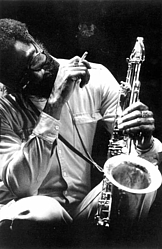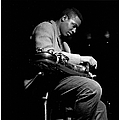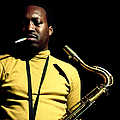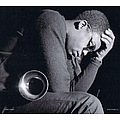Joe Henderson ( Lima, Ohio, April 24, 1937 - San Francisco, California, June 30, 2001) was an American jazz tenor saxophonist. He studied music at Kentucky State College and Wayne State University before playing in Detroit at the beginning of his career. After a two year hitch in the U.S. Army (1960-1962), Joe arrived in New York where trumpeter Kenny Dorham provided valuable guidance. Although Henderson's earliest recordings were marked by a strong hard-bop influence, his playing encompassed not only the bebop tradition, but rhythm and blues, latin, and avant-garde as well. He soon joined Horace Silver's band and provided a seminal solo on the jukebox hit Song For My Father. After leaving Silver's band in 1966, Henderson resumed freelancing and also co-led a big band with Kenny Dorham. Henderson's arrangements for the band went unrecorded until the release of his album Big Band on Verve Records in 1996. From 1963 to 1968 Joe appeared on nearly thirty albums for Blue Note. The recordings ranged from relatively conservative hard-bop sessions to more avant-garde explorations. He played a prominent role in many landmark recordings: Horace Silver's swinging and soulful Song For My Father, Herbie Hancock's dark and densely orchestrated Prisoner, and Andrew Hill’s avant-garde Black Fire. In 1967, there was a notable, but brief, association with Miles Davis' famous quintet featuring Herbie Hancock, Wayne Shorter, Ron Carter, and Tony Williams. Although the band was never recorded, Henderson is reputed to have occasionally stolen the show. Henderson's adaptability and eclecticism would become even more apparent in the years to follow. Henderson's sound can float prettily like Stan Getz or Lester Young but he can also dig in with the bluesy fervor of T-Bone Walker or the intensity of John Coltrane. In a March 1993 Down Beat interview Joe noted the influence of literature in his playing. "I try to create ideas in a musical way the same as writers try to create images with words. I use the mechanics of writing in playing solos. I use quotations, commas, and semicolons." The increasing complexity and ornamental nature of his current output suggests Henderson has created his own unique vocabulary of phrases, licks, and saxophone effects. On June 30, 2001, Joe Henderson passed away in San Francisco, California, due to heart failure after a long battle with emphysema.
















